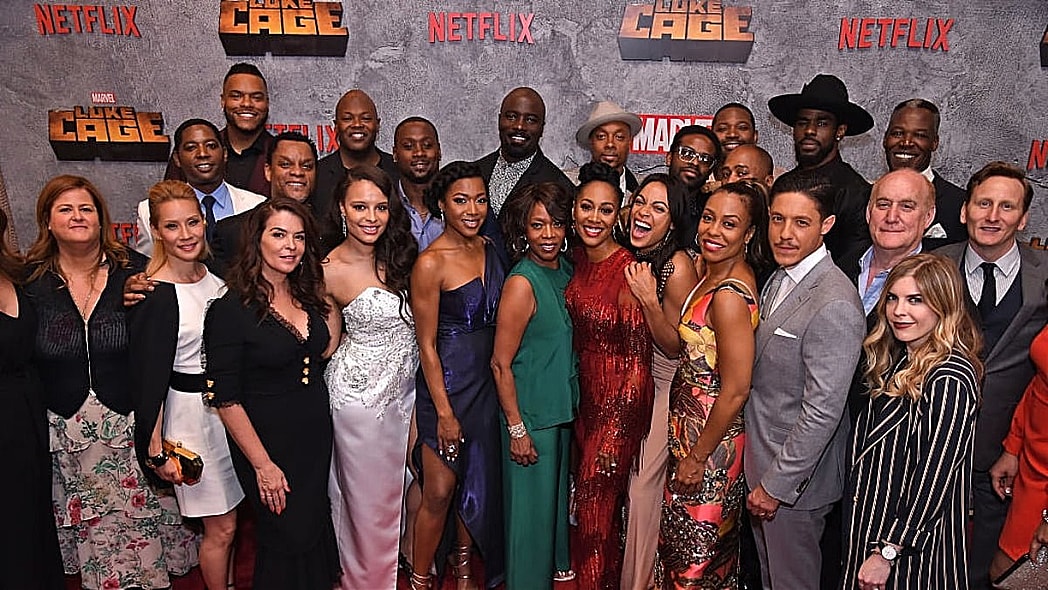I have a confession to make, I’m not one of those cool hipster chicks who keeps up with comic book heroes and such. In fact, until I got my passport stamped in Wakanda in February, the only super hero movies I had seen in the last 15 years where Iron Man and Wonder Woman, and I fell asleep during the latter.
Even for my decidedly uncool self, Black Panther gave me a newfound appreciation for this genre, and I found myself caught up in the rapture (shout out to Anita Baker) of seeing Black bodies glorified on screen as beautiful, powerful, and yes even desirable protagonists who could literally save the world.
This is why (and how) I found myself sitting in front of my television during the 4th of July, ready to binge watch two full seasons of Netflix’s Black super hero hit, Luke Cage.
I’m not going to lie, at first, I was a skeptic.
Like most shows and movies based on Marvel characters, there were already legions of die-hard fans who had already read the comic books and would undoubtedly be watching the show. Since the only comic book I’m familiar with is Archie, I was prepared to sit through a bunch of complicated inside jokes that would go over my head. Much to my surprise, Season one did a decent job of fleshing out Luke Cage’s hyper woke version of Harlem and went at a pace that made it easy for even a novice to follow.
By the end of that season I was thinking, ‘O.K. Not bad.’ Then promptly forgot about it for three days before returning to watch the rest.
Apparently, a lot of people had the same feeling about that season. Showrunner Cheo Hodari Coker has actually admitted that he and his team collected feedback from critics and used some of their most scathing reviews as fuel to inform the second season.
READ MORE: EXCLUSIVE – Cheo Coker on how Hollywood will change after ‘Black Panther’
And boy does it show.
In fact, now that I’ve watched all 26 episodes of both seasons (and allowed my pupils to dilate a bit) I can say that I’m blown away by how thoughtful and emotionally grounded this series has become. Not to mention, there is one cast member in particular who BETTER get an Emmy nod, or I may be personally offended with the needs to roll up on somebody demanding answers.
For anyone on the fence about this show, here are my top five reasons why you need to check out Season 2 of Luke Cage on Netflix, even if you don’t know a damn thing about comic books.
1. African American vs. West Indian – there’s a difference
It would be disingenuous of me to talk about the great writing that took place in the latest 13 episodes of Luke Cage without mentioning the big green, black and yellow elephant in the room.
In a nutshell: Whoever decided to write an ambitious story arc about Jamaicans and how West Indian culture (in general) can sometimes collide with African American culture, BUT somehow forgot to cast any actual Jamaicans who can speak the native dialect, needs to put their ego aside, take the L and admit they messed up.
I am a proud member of the Caribbean community, and even though I don’t personally speak Patois, I had to pause for a second when this season’s charismatic antagonist Bushmaster came on the screen. His stature and mere presence were immediately impressive, but that accent?
Bruh.

What part of Kingston produces a Black man sounding like a cross between Miss Cleo and the Leprechaun from the Lucky Charms cereal commercials?
To the credit of Mustafa Shakir, he is an actor who is clearly wholeheartedly committed to his role (in spite of the Jah’faken accent). So much so that for a hot minute I wondered if maybe I was overreacting and legit wondered if somehow a legion of Rastas had landed in Dublin. Anything is possible.
Could it be my own ignorance keeping me from understanding why this man sounded like that? I was beginning to wonder if I was being too harsh until the next “Jamaican” character came on screen sounding more like Nelson Mandela speaking Afrikaans.
Then I was like, “Ok, now this is just bad fam. Throw the whole dialect coach away.”

Despite this complete fail, the show did a great job of highlighting the tensions, judgements, and culture wars that can sometimes take place between African Americans whose slave ancestors built this country vs. immigrant Blacks who were raised to believe that their true “home” is elsewhere.
One of the most divisive lines in the show happens when an African American character nicknamed Cockroach is vying against a Jamaican counterpart to do business at Harlem’s Paradise, the opulent club that serves as a local jaunt and hub for much of the shows climaxes.
READ MORE: Diddy calls ‘Black Panther’ a ‘cruel experiment’ for this surprising reason
“Keep Harlem Black, the way it should be,” Cockroach pleads. “Southern Black. Ain’t talking about no cigar-smoking Black, no ganja-smoking Black. Black Black. I think you know what I’ve talking about.”
And yes, it is very clear what he is talking about. Black Black, which is implied to be REAL Black is from the American South, and the rest of us who showed up from other lands are what exactly…?

While our oppressors like to pretend that Blackness is a monolithic experience and Africa is just one big country where people live in huts and walk around topless, most educated people of color are aware of the rich diversity that exists under the umbrella of the African diaspora.
READ MORE: This Is America: 5 powerful messages that will stay with you long after your Donald Glover hangover
Even though America is a country mostly made up of immigrants, there still seems to be this persistent debate about what truly makes you Black; particularly in heavily populated urban areas like Harlem and Brooklyn where you could see three brown skinned people who look related, but one is Dominican, the other is Jamaican and the third can only trace their roots as far back as Georgia.
Luke Cage‘s willingness to explore the uncomfortable tensions between different cultures within the Black community is commendable, and that alone makes it worth checking out.
2. Strong men have strong feelings
Usually when you watch a show with a Black male lead he’s portrayed as this hard, scowling, tortured soul who is trying to work through some core wound while the other men in his life are just varying shades of stoic and emotionally distant. Unless you’re watching a comedy, then you’ll stand the chance of watching men be funny and self-deprecating. These two examples pretty much sum up the entirety of the masculine experience.
Which is why it was refreshing, and incredibly surprising, to see so much vulnerability, honesty, and variety in how men were portrayed dealing with their feelings this season.
Super heroes and their eco-system are usually full of hyper masculine muscle heads who throw grenades at each other. On Luke Cage it goes deeper than that…a lot deeper.
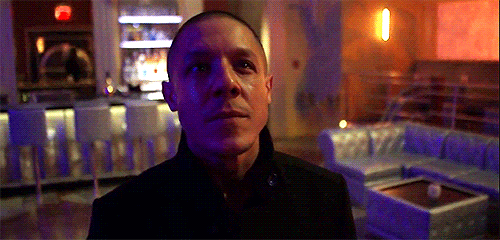
*SPOILER ALERT* – If you haven’t watched the show yet, skip the next couple paragraphs and move on to the next section.*
Luke Cage, formerly known as Carl Lucas, is grappling with his rage and unresolved daddy issues, and ends up getting dumped by his girlfriend, played by Rosaria Dawson, who would rather break her own heart and leave him than risk being his emotional mule any longer.
Shades, the shady gangster who lurked in the shadows throughout most of Season one, has now fallen in love with a Black woman and finds himself wanting to live a life of purpose. He wants to fulfill the American Dream with her, far away from all the violence and chaos he was instrumental in creating.
Bushmaster, who to be frank, has a storyline that reminds me so much of Killmonger from Black Panther. I halfway expected Michael B. Jordan to show up to his family’s restaurant and ask for a beef pattie. He masterfully becomes the embittered prodigal son who’s returned to claim what was unjustly taken from his family.
From the way Luke talks to the young men in his community to the way men of color speak to each other, there is a tenderness in the way they engage with each other that is undeniable. Real men, bad ass dudes, and even dangerous bad guys, all have feelings.
Who knew?
3. The impact of generational trauma
Some religious people believe that “the sins of the father” will be repeated by the son. Exodus 34:7 says that God “visits the iniquity of the fathers upon the children and the children’s children to the third and fourth generation.”
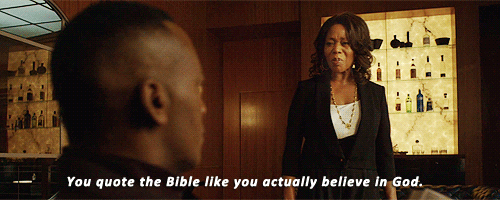
Whether you believe in generational curses or not, it’s undeniably that generational trauma is a real epidemic in our communities. In one scene, a character known as Nightshade says, “Sometimes when we unpack baggage and repack it, it’s not as heavy.”
And to her point, unpacking the normalized dysfunctions that exist in the Black community has now become a reoccurring theme on Luke Cage. In Season one everyone was running from their past, and in Season two, they’re all forced to confront their karmic debt head on.
With the African American Stokes family and the West Indian McIver family serving as a modern-day version of the Hatfields and McCoys, we get to see a lot of common and painful dynamics play out. The way Black parents often handicap their children by shielding them from the truth, the way our families often force little girls to share space with the men who abuse them, the longstanding effects of colorism, our complicated relationship with Christianity vs. the more holistic African based religions our ancestors practiced, and last but not least, the importance of legacy and generational wealth.
Like the kids say, Issa lot!
To the credit of this show, they do strike a good balance between the high paced action people want to see and the more introspective moments of reflection that the audience probably needs to see.
Emotionally intelligent, “woke” Black characters are becoming a thing and I’m so damn here for it!
4. Black women have a voice, and a really strong one at that
No disrespect to Mike Colter, Theo Rossi or any of the incredible male actors in this uber talented ensemble cast, but this season, even while the men were working through all their feelings and having a ton of existential crisis – the women, very decidedly stole the show.
READ MORE: EXCLUSIVE – Simone Missick on powerful women and mastering Misty Knight on ‘Luke Cage’
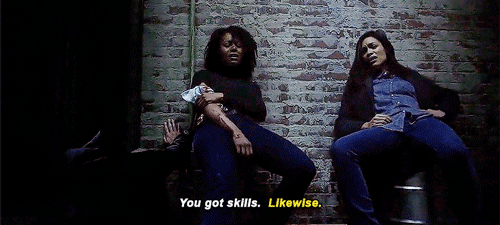
From Rosario Dawson playing Luke’s Afro-Cuban nurse girlfriend who takes care of everyone including her man to the hot-blooded, stubborn, and incredibly resilient Misty Knight played by Simone Missick, who crackles so much on screen, she comes off more as an equal to Luke than just his sidekick.
In fact, if I had to choose who the biggest standout of the season (and perhaps the entire series) it would definitely be a woman whose performance is so inspired it deserves its own entry on this list.
5. Alfre Woodard is a national treasure.
I was having a chat with a TV writer once and he explained to me, “Movies highlight directors, plays highlight actors, but television is all about the writing. That’s where writers get their moment to shine.”
And for the most part I agree with that assessment. Everyone in the Luke Cage writer’s room showed up with something to prove this time around and that’s a huge part of why the season was so good.
But baby, I promise you… that if you had given the role of Mariah Dillard to anybody but Alfre Woodard, it wouldn’t have been the same.
In the words of Beyonce, she did NOT come to play with you heauxs.
Someone needs to just go on ahead and teach a master class on character development where they literally just play every one of Woodard’s Luke Cage scenes (in chronological order) with nothing else in between.
You wouldn’t even need a teacher; just a pre-recorded message at the end of the video montage saying, “Aight ya’ll. Just do all THAT and you’ll get nominated for an EMMY. Class dismissed.”
In fact, as I stated earlier, if Woodard doesn’t get nominated, I will probably be hella salty and personally offended by the oversight. Her story arc was complicated, nuanced, at times even painful to watch, but always believable and surprisingly human.
Which is insane because by the middle of Season two, Mariah Dillard had very clearly morphed into the living embodiment of the devil. And do you know how hard it is to make the devil likable? Especially as a Black woman?
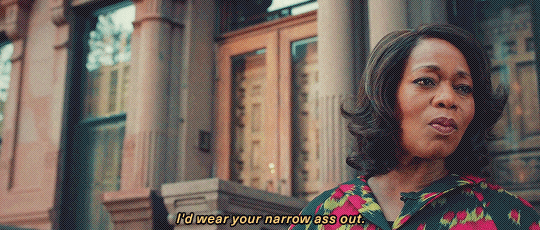
The one scene that had me gasping for air happened in Episode 9 while Mariah is talking to her daughter Tilda at the police station.
“Kids used to make fun of me cause I was dark,” she admits. “Said I looked like an African. BLACK MARIAH!”
The pain in Woodard’s face when she screams out “Black Mariah!” while clearly reliving that moment, almost broke me in half.
And then she proceeds to go into a brilliantly written monologue about how her undesirability as a dark skinned Black woman is exactly what made her the perfect victim for her child abusing uncle.
“Pete was the only one who told me I was beautiful. He reminded me how smart I was. I loved him. Until he started sneaking into my room at night.”
Man, look.
Do you know how many women are going to watch that scene and find themselves sobbing by the end of it? For all her flaws (which there are many), I have to say that Mariah’s character made me realize that we actually need more depictions of flawed, ANGRY, three dimensional sisters on television.
After years of being depicted as prostitutes and hood rats, we thrusted our way to the other extreme and only wanted to be depicted as a Michelle Obama type or maybe the occasional Olivia Pope.
But what about all the messier shades of Black womanhood in between? What about the problematic auntie? The chronically depressed cousin? Or yes, even the homicidal crime boss? When do we get to see them?
I read somewhere that this positive stereotype of the “strong Black woman” actually has had adverse effects because it’s made WOC feel like they have to pretend to be strong even in moments when being weak would make more sense.
And perhaps that’s why you at times find yourself rooting for Mariah even when she’s behaving poorly. It’s almost cathartic to watch a Black woman finally get a chance to show her ass, and still be treated like a human being afterwards.
That sentiment is what made Season 2 of Luke Cage such an overall success. Even though at its core, this is a show about super heroes, it actually portrays Black people as flesh and blood HUMANS who are worthy of our time even when they mess up.
As Jesse Williams once infamously said in his BET Humanitarian Award acceptance speech, “Just because we’re magic doesn’t mean we’re not real.”
Word.
Follow writer Blue Telusma on Instagram at @bluecentric

